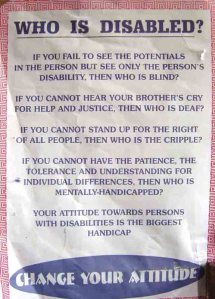ICTs can transform the lives of those with greater disabilities far more than they can the lives of those with fewer disabilities. However, global commitments to ensuring universal access have all too often failed sufficiently to address the specific needs of people with particular disabilities.
This site has therefore been developed by Tim Unwin (UNESCO Chair in ICT4D, and former Secretary General of the Commonwealth Telecommunications Organisation) to provide ready access to information and support in the use of ICTs by people with disabilities.
The Commonwealth Telecommunications Organisation
When I was Secretary General of the Commonwealth Telecommunications Organisation between 2011 and 2015, I championed ways through which people with disabilities can be empowered through the use of ICTs. Some of the activities that we undertook were
 In August 2012 the CTO hosted a Ministerial Summit on e-Accessibility together with the UK’s Department for Culture, Media and Sport. The summit provided a platform for delegates to discuss how countries can turn the rhetoric of their policies into practical actions that will make a difference to the lives of people with disabilities. The summit concluded with agreement around eight action points that are necessary for taking this forward:
In August 2012 the CTO hosted a Ministerial Summit on e-Accessibility together with the UK’s Department for Culture, Media and Sport. The summit provided a platform for delegates to discuss how countries can turn the rhetoric of their policies into practical actions that will make a difference to the lives of people with disabilities. The summit concluded with agreement around eight action points that are necessary for taking this forward:
- The inclusion of e-inclusion on the CHOGM agenda;
- Policies and practices so that people with disabilities should have equal access to ICTs and accessible information, without having to pay a premium for it;
- An e-inclusion champion in every Commonwealth country;
- An e-inclusion policy in every Commonwealth country;
- The sharing of examples of existing good practice in the Commonwealth and beyond;
- Government and business use of ICT procurement to encourage inclusive design;
- The Accessible Technology Charter; and
- Effective training programmes on e-inclusion for governments, the private sector and civil society.

- Subsequently, in March 2014, Commonwealth ICT Ministers affirmed these eight principles in a formal declaration, that also affirmed that Universal Service and Access Funds can be used effectively to support all underserved people, including those with disabilities.
- One example of the CTO’s work was the very successful workshop on ICTs for people with disabilities in the Caribbean region convened by the CTO and the HEART initiative in Antigua in February 2015 (selected presentations and all workshop outputs).
Key resources
- Disabled World – launched in 2014 to provide an international online community for people with disabilities
- International Disability Alliance
- ITU and G3ICT (2014) Model ICT Accessibility Policy Report, Geneva: ITU (lead author Mandla Msimang)
- UN Convention on the Rights of Persons with Disabilities
- UNESCO (2014) Model Policy for Inclusive ICTs in Education for Persons with Disabilities, Paris: UNESCO (with European Agency for Special Needs and Inclusive Education and G3ICT)
- UNESCO (2016) Digital Empowerment: Access to Information and Knowledge Using ICTs for Persons with Disabilities, UNESCO: Paris
- WHO International Classification of Functioning, Disability and Health (ICF)
Nice piece would want to learn more and engaged in some activities!